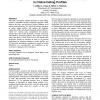Free Online Productivity Tools
i2Speak
i2Symbol
i2OCR
iTex2Img
iWeb2Print
iWeb2Shot
i2Type
iPdf2Split
iPdf2Merge
i2Bopomofo
i2Arabic
i2Style
i2Image
i2PDF
iLatex2Rtf
Sci2ools
95
Voted
CSCW
2010
ACM
2010
ACM
Reading between the lines: linguistic cues to deception in online dating profiles
This study investigates whether deception in online dating profiles is detectable through a linguistic approach, which assumes that liars nonconsciously produce different word patterns than truth-tellers. We objectively measure deception in online dating profiles and analyze the linguistic composition of the open-ended component of the profile (i.e., “about me” section) using computerized text analysis. Results show that profile deceptions correlate with fewer self-references, increased negations, fewer negative emotion words and fewer overall words used in the textual selfdescription. Results are discussed in terms of (1) practical implications for detecting deception in online profiles; and (2) theoretical implications regarding the impact of media affordances (i.e., asynchronicity and editability) on the occurrence of linguistic cues to deception. Author Keywords Deception, linguistic cues to deception, online dating, social networking sites. ACM Classification Keywords J4 Soci...
Author Keywords Deception | CSCW 2010 | Linguistic Cues | Online Dating Profiles | Social Sciences |
| Added | 17 Mar 2010 |
| Updated | 17 Mar 2010 |
| Type | Conference |
| Year | 2010 |
| Where | CSCW |
| Authors | Catalina L. Toma, Jeffrey T. Hancock |
Comments (0)

